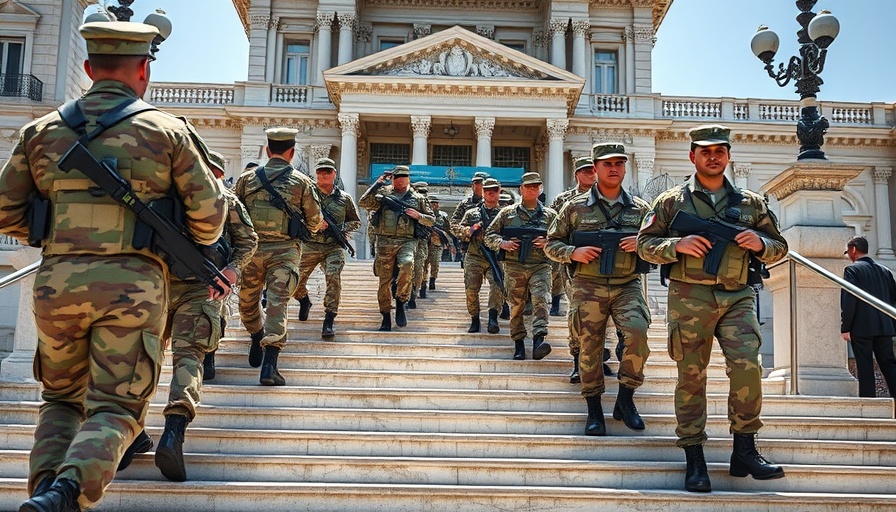
A New Chapter in the Quest for Peace
The ongoing conflict between Russia and Ukraine has entered yet another pivotal moment with recent peace talks held in Turkiye. Delegations from both countries met at the Ciragan Palace, with the Turkish Foreign Minister, Hakan Fidan, overseeing the discussions. Amid an atmosphere of caution and skepticism, both sides are expected to deliberate on a resolution to end a prolonged war that has dramatically reshaped the region.
Despite the potential for diplomatic breakthroughs, the backdrop of escalating hostilities looms large. Just before the peace talks commenced, Ukraine executed a bold drone attack on key Russian air bases, reportedly destroying approximately 40 aircraft. This marked a significant escalation in military operations, which has raised serious questions about the likelihood of reaching an agreement.
The Misalignment of Expectations
Both delegations are led by prominent figures: Ukraine's Defense Minister Rustem Umerov and Russian aide to President Vladimir Putin, Vladimir Medinsky. However, reports reveal that expectations are tempered, as fundamental differences in each side’s war cessation conditions remain apparent. Statements from high-ranking officials indicate a persistent gap that will need to be bridged for any potential agreements to hold moving forward.
This schism reflects a broader trend observed throughout the conflict. Just a few weeks ago, initial peace talks yielded similarly low expectations, signaling that negotiation may be less about finding common ground and more about posturing. As the pressures of war mount, the urgency for a ceasefire will spark debates about both parties' willingness to constructively engage. In light of the recent drone strike, questions arise regarding whether ongoing hostilities will derail diplomatic efforts altogether.
Historical Context: The Long Road to Peace
The roots of the Russia-Ukraine conflict can be traced back to complex historical grievances, stemming from issues of sovereignty, territorial integrity, and national identity. The annexation of Crimea in 2014 by Russia ignited the flames of war, resulting in a multi-year struggle that has included both military engagement and intermittent diplomatic dialogues. The recent peace talks in Turkiye are but the latest in a series of attempts to quell conflict through negotiation rather than combat.
Historically, peace talks in such protracted conflicts have often yielded little success, primarily because of diverging national interests and territorial claims. Each failed attempt is followed by increased animosity and mutual distrust, complicating the prospects for meaningful negotiations. As Ukraine and Russia resume their talks, understanding this historical context is essential to grasping the intricacies of their current diplomatic stance.
Implications of Military Escalation
The recent military actions from both sides, particularly Ukraine's drone strikes far into Russian territory, could have significant implications for the peace talks. As detailed in the reports, the scale of the Ukrainian attack heralds a profound shift in military strategy, signaling that Ukraine may be willing to adopt a heightened aggressive posture if diplomatic avenues remain unfruitful.
If this inclination continues, Russia may respond by reinforcing its military positions, further entrenching both parties in their respective commitments to the war. This escalatory cycle not only jeopardizes ongoing diplomatic efforts but also puts civilians at greater risk. The reality is that dialogues can only successfully take place when both parties feel a mutual incentive to genuinely reach a solution.
Future Insights: The Road Ahead
As peace talks continue, observers remain cautiously optimistic yet acutely aware of the precarious situation. The trajectory of these discussions will likely influence not only the immediate futures of both countries involved but also the wider geopolitical landscape, impacting relations with other nations embroiled in the conflict.
Furthermore, both Ukraine and Russia must consider external pressures that shape their negotiation stances—such as economic sanctions, alliances with other countries, and domestic political landscapes. Moving forward, the ability to navigate these complex terrains will be pivotal in paving the way for any meaningful resolutions.
Final Thoughts
The recent peace talks between Russia and Ukraine in Turkiye represent both hope and skepticism in the ongoing saga of this conflict. The backdrop of military escalations complicates the dialogue but also underscores the importance of finding common ground in pursuit of long-lasting peace. As both sides grapple with the aftermath of recent events, the world watches closely to see if negotiations can indeed yield a lasting solution to a crisis that has had profound global implications.
 Add Row
Add Row  Add
Add 




 Add Row
Add Row  Add
Add 

Write A Comment